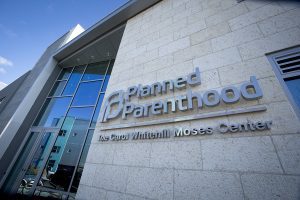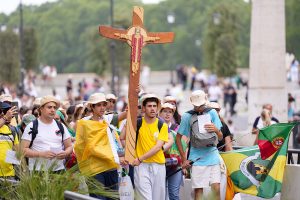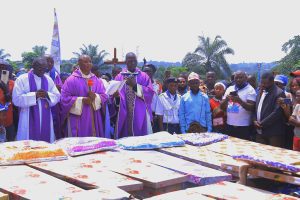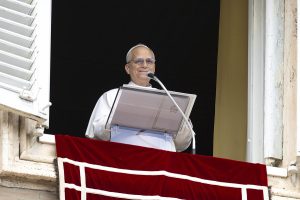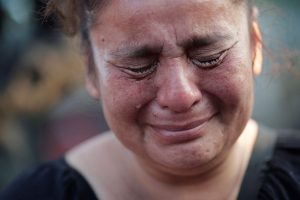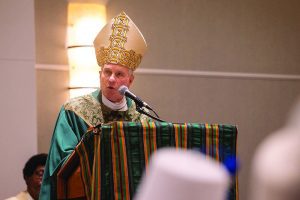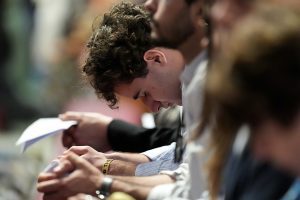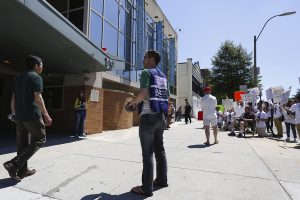VATICAN CITY (CNS) – The enthusiastic joy of young people, who love Jesus and want all wars to stop, will be heard to the ends of the earth, Pope Leo XIV said, welcoming tens of thousands of cheering young men and women to Rome for their Jubilee.
“Buona sera, buenas tardes, good evening!” he said after finishing a long ride in the popemobile, waving to more than 120,000 ecstatic visitors filling St. Peter’s Square and the long, wide boulevard that runs between the square and Castel Sant’Angelo by the Tiber River.
The pope appeared at the end of a Mass presided over by Archbishop Rino Fisichella in St. Peter’s Square July 29 as part of a series of welcome celebrations for the weeklong Jubilee of Youth.
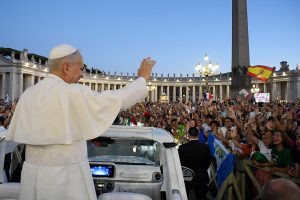
A rainbow of colors covered the streets and squares as different pilgrim groups wore coordinated colored T-shirts or hats, and scores of national flags billowed in the gusting evening wind.
“Jesus tells us you are the salt of the earth. You are the light of the world,” Pope Leo said in English.
“And today, your voices, your enthusiasm, your cheers, which are all for Jesus Christ, will be heard until the ends of the earth,” he said in Spanish to huge cheers.
“Today marks the beginning of a journey, the Jubilee of Hope, and the world needs messages of hope. You are this message, and you must continue to give hope to everyone,” he said.
“Let us walk together with our faith in Jesus Christ,” he said in Italian. “And our shouts must also be for peace in the world.”
“Let’s all say it: We want peace in the world!” he shouted, as the crowd responded, “We want peace in the world.”
“Let us pray for peace” and be witnesses to “the peace of Jesus Christ, the light of the world that we are all seeking,” he said, as the evening twilight turned to night and the waxing crescent moon appeared brightly.
It was Pope Leo’s second “surprise” appearance July 29, after arriving to greet the faithful at the end of a morning Mass presided over by Cardinal Luis Antonio Tagle, marking the conclusion of the Jubilee of Digital Missionaries and Catholic Influencers July 28-29.
The pope was scheduled to lead his weekly general audience in St. Peter’s Square July 30, and then lead an evening prayer vigil Aug. 2 and morning Mass Aug. 3 in Rome’s Tor Vergata neighborhood, where close to 1 million young people were expected.
Cardinal Tagle and Archbishop Fisichella lead the two sections making up the Dicastery for Evangelization as pro-prefects. The archbishop’s section has been in charge of organizing the Holy Year.
Before celebrating the evening Mass in the square July 29, Archbishop Fisichella welcomed the young people on behalf of the pope, especially those who came from war-torn regions.
“May the fraternal embrace that unites us as one body reach those from Ukraine and Palestine and other countries,” he said. Two young men from Palestine wore the traditional keffiyeh, a wide scarf, over their shoulders during the Mass as they brought up the offertory gifts.
“Make sure to show them a sign of your friendship,” the archbishop said in his greeting before Mass.
To those who had to make many sacrifices to come to Rome, he said, “The Lord will not disappoint you. He comes to meet you — remain vigilant so that you may recognize his presence in your life.”
“Live these days with joy and spirituality, discovering new friendships,” and enjoying the city of Rome, he said.
“We are here to hand on the faith and to understand the great value that Jesus Christ brings into our lives. Let us respond with enthusiasm in these days: Rome, with all that it represents, is in your hands,” Archbishop Fisichella said.


